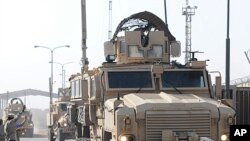Iraqis are expressing mixed emotions about President Barack Obama's announcement to withdraw all U.S. troops from their country by the end of the year. Some say they worry about continued fragile security, while many others say that nearly nine years after the U.S.-led invasion, it's past time the Americans go home.
In the streets of Baghdad, Obama's announcement was greeted with joy. Resident Bilal says the U.S. decision was the correct one: the Americans leave behind destruction and sedition, but Iraqis will rebuild the country after the withdrawal.
While many Iraqis welcomed the U.S. invasion that toppled Saddam Hussein in 2003, that soon faded as the oppression of the Saddam years was replaced by the unleashing of sectarian violence and near civil war.
The U.S. had promised three years ago to leave by the end of this year, so the decision did not take some people by surprise.
But Abdullah al Agili, also in Baghdad, says he thinks the American presence is still needed, arguing the Iraqi army is weak and divided on sectarian lines.
Sectarian violence still flares across the country, with bombings and shootings claiming dozens of lives each month.
American officials also worry that the continuing unrest may make it easier for neighboring Iran to gain a greater foothold in the Arab nation once the troops leave.
Iraqi and U.S. officials had long speculated that several thousand troops would stay beyond 2011. But the matter came down, in part, to one of sovereignty - the talks on extending the mission breaking down over the U.S. demand of immunity from Iraqi prosecution for its forces.
Still, even after the announcement, Iraqi officials held open the idea that some U.S. military presence could still be needed, in particular for training the fledgling Iraqi army.
Iraqis Split Over US Troop Withdrawal













